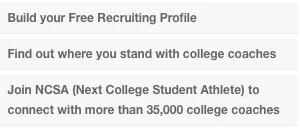Ok State Camp Loophole Unlikely to Last For Long
The loophole in NCAA rules that allows Oklahoma State to circumvent NCAA regulations on satellite football camps, as reported by Dan Wetzel and Pat Forde, is pretty ingenious. Essentially Oklahoma State farms out satellite football camps in Texas to a Division III school. According to the NCAA’s definition of an “institutional camp or clinic”, these are not OSU’s camps despite their name and trademarks plastered all over the place:
An institution’s sports camp or instructional clinic shall be any camp or clinic that is owned or operated by a member institution or an employee of the member institution’s athletics department, either on or off its campus, and in which prospective student-athletes participate.
Because the camps are owned by the University of Mary Hardin-Baylor and OSU’s coaches are simply employed by the camp, this is allowed. Texas head coach Mack Brown has some wishful thinking about deregulation:
Brown told Yahoo! Sports that if the loophole is so easily exploited in Texas by out-of-state schools, then “let’s clean it up and make it legal,” essentially undoing the 2007 rule and ending all the confusion.
Camps are a big deal in football recruiting. A far bigger deal than phone calls and letters. So if even some major conference schools balked at unlimited calls, texts, and the potential to mail Fatheads to recruits, what do you think they will say about allowing the have-mores to run football camps at a loss in their backyard?
More likely is we will see the loophole quickly eliminated, as early as October when the Division I Legislative Council and Board of Directors meet again. One change would be to tweak the definition of an institutional camp to include one which “uses an institution’s name, logo, or trademarks”. Alternatively or additionally, the rules about football coaches working noninstitutional camps could be changed:
In bowl subdivision football, an institution’s coach or noncoaching staff member with responsibilities specific to football may be employed (either on a salaried or volunteer basis) in any capacity (e.g., counselor, guest lecturer, consultant) in a noninstitutional, privately owned camp or clinic at any location, provided the camp or clinic is operated in accordance with restrictions applicable to an institutional camp or clinic (e.g., open to any and all entrants, no free or reduced admission to or employment of athletics award winners).
Deleting the “at any location” phrase would limit coaches to working camps that meet all the requirements of an institutional camp, including the restrictions on location.
Deregulation of institutional satellite camps might stop the end-around NCAA rules, but it would be another example of the NCAA fighting the last war. Oklahoma State working with a DIII school to get around NCAA rules is almost cute. But now imagine a school working with key 7-on–7 or high school coaches in Texas to operate camps that get the college coaches in front of prospects and put money in the pockets of the prospects’ coaches, who magically decide to steer their players to that school.


